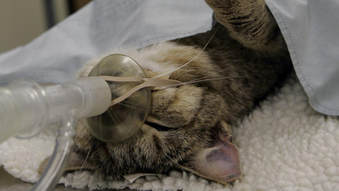 Welcome to 2018. I hope your new year has started off well and that you have been able to shed your holiday stress or any 2017 worries that were dragging you down. If you made any new year's resolutions, I wish you well in your efforts to keep them. If you didn't make any resolutions, I have a few for you to consider regarding companion animals. None of them cost very much and most simply have to do with decisions you make or a small investment of your time. Microchip your pets. Not a day goes by when I am not contacted about someone's beloved companion animal who is missing due to some unexpected event or circumstances. Having a pet go missing or - worse yet - having a pet stolen, can be incredibly stressful for most families, not to mention the pet who is lost. We all presume that because we love our pets and take good care of them that they will never be displaced from us. Life happens. Accidents happen. Doors get left open, gates do not latch, fences get jumped and animals get scared. The sad truth is that the vast majority of animals who are displaced from home never make it back home and their families have no idea what happened to them. In progressive areas, this is not always a death sentence because healthy and treatable animals entering shelters are kept alive. In less progressive areas, the fact that your pet cannot be identified can lead to the death of your pet even if he or she is perfectly healthy, treatable and social to people. Although I recommend that dogs and cats both wear collars with identification (provided the cat collar is a breakaway design to prevent strangulation), there really is no substitute for having your pet microchipped. A microchip is not a GPS tracking device. It is a small ampule about the size of a grain of rice which is injected under your pet's skin at the base of the neck. It contains a unique number, much like a bar code, which can be scanned. Provided your chip is properly registered, the chip can be traced back to you and authorities can get your pet back to you. This helps not only animal control and animal shelter personnel, but also helps veterinary offices and law enforcement authorities. Most microchips are very cheap. You can buy one yourself and have it implanted by your veterinarian. You can also be on the lookout for a local microchipping event like the one going on in the city where I work now. Pets are being chipped for $20 which includes the registration fee. Most people spend that much on a dog or cat toy. It truly may be the best money you ever spent to help your displaced pet get back home to you where he or she belongs.  Make a care plan for your pets. Another subject I hear about almost every day is pets who need to be rehomed due to some unexpected event or crisis. Someone dies. Someone is diagnosed with a terminal illness. A house burns down. A job is lost or there is some financial crisis. I have written before about the concept of having a Pet Parent for your pets; I cannot encourage you strongly enough to do this. Much like you make plans for the care of your children in the event something happens to you, please make the same plans for your pets. This cannot be some vague assumption that a family member or friend will step up and take your pets for you and care for them for the rest of their lives. It needs to be a serious conversation to get a solid commitment from someone you know that yes, they will take your pets in the event of your death or your inability to care for your pets. You don't need to go so far as to have someone sign a contract which is legally binding. I do recommend, however that you prepare a list of instructions regarding the transition of ownership of your pets and about their care, providing a copy to your designated Pet Parent. If you died suddenly, how would your Pet Parent get into your home? Where are the veterinary records? Things as simple as what your pet eats and about his or her habits and behavior are important to set out in writing so that the transition from your home to another home is as smooth as can be expected and the stress on your pets is reduced. My cousin has agreed to be the Pet Parent for our dog and she will love him and care for him for all of his days. I would like to think the odds of putting this plan in place are incredibly low. Because we love our dog, we have made plans for his care and to ensure he doesn't end up either being passed around from person to person or end up in an animal shelter where he may be destroyed. Spay and neuter your pets. Many people are surprised to learn the health benefits of having companion animals fixed, not the least of which is an extended life span. If you've ever lost a beloved companion animal to age or disease, you know the heartbreak of that loss. Given the choice, would you add years to your pet's life if you could and keep them healthier? You can through spay and neuter. It's good for your pet. Spaying/neutering helps dogs and cats live longer, healthier lives by eliminating or reducing the incidence of a number of health problems that can be very difficult and/or expensive to treat. Some reports indicate that having your pet fixed can add as much as three years to his or her life. It's good for you. •Spayed/neutered pets are usually better behaved and more calm and affectionate than those that are not spayed/neutered. It also decreases an animal's desire to escape and wander the neighborhood in search of a mate. This decreases the risk of fights, death caused by getting hit by cars, and lost or stolen pets. It's good for the community. Spay/neuter decreases the homeless animal population, reducing the number of animals needlessly destroyed. Some communities have financial assistance programs to help offset costs and some regions offer clinics which do nothing but spay/neuter surgeries at very low rates.  Speak out about issues which relate to companion animals in your community and your state. If you oppose Breed Specific Legislation, let those in positions of authority know how you feel. If you believe the best way to reduce the population of feral cats is through Trap-Neuter-Return programs, support those programs in your own neighborhoods. If you believe that the animal shelters in your community which operate using your tax dollars and donations are not doing all they can to save lives, speak up. Only when you make it clear that you value the lives of homeless animals will those lives become a priority. Saving lives doesn't mean spending more money in a community and it often saves taxpayer dollars. Support local rescue groups and national animal advocacy groups the focus of which are saving lives. There are many multi-million dollar organizations in our society which engage in very visible marketing. If you look at their funding or how they operate, you may find that your donations are used primarily to fund salaries, lobbying and marketing while very little (or none) of your money is actually used to rescue or save animals. If you want to help the cause by making a tax deductible donation, you can do so right where you live or to any nonprofit across the country which is actively involved in being the change. If you cannot donate money, you can always donate your time by volunteering at a local no kill shelter or with a local rescue group. You can also donate common items you may have in your home which you no longer use such as old towels, old blankets, newspaper, used dog or cat beds, etc. Adopt or rescue your next companion animal. Although many people have come to believe that shelter and rescue animals are somehow "damaged," that is rarely the case. The truth is that most of them are simply homeless and are victims of our poor choices. If you have your heart set on a particular breed for some reason, there's nothing wrong with that. Seek out a breed specific rescue group or just a specific breed of animal using Petfinder or a comparable web site. There are countless reputable breeders across our country, many of which breed animals for the sheer love of the breed and to perpetuate breed standards. If you're considering buying an animal, however, ask yourself this: do I really need to spend hundreds or thousands of dollars on a companion animal when I can save a life instead? Consider fostering an animal. There are people who may not want the long-term commitment of a pet but who are great with pets. Do you not have a pet because you think you are too old? Foster. Do you not have a pet because you want the freedom to travel a lot? You can foster. Do you want to help a deployed troop so he does not have to surrender his beloved dog to the shelter? Fostering that dog means he can stay local and be returned to his owner when the deployment ends. Do you want to help neonatal puppies or kittens who need regular bottle feeding for a few weeks until they can eat solid food? Yep. You can foster. (image of Baby Watson courtesy of Lori Anne Truman)
0 Comments
|
AuthorI am an animal welfare advocate. My goal is to help people understand some basic issues related to companion animals in America. Awareness leads to education leads to action leads to change. Archives
July 2024
Categories
All
image courtesy of Terrah Johnson
|

 RSS Feed
RSS Feed